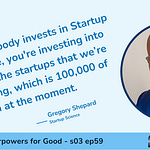Devin: What do you see as your superpower?
Dan: I would say one of the things that I’ve been blessed with is the ability to win people’s trust and confidence, specifically leaders. I just have this chronic problem of thinking of others first, almost to a fault. I think that helps.
“We all know what it’s like maybe to work for a boss that inspires us and pulls the best out of us,” says Daniel Cooper, CEO and founder of ROC Investments. “We also know what it’s like to probably work for a boss that doesn’t do that, [who] makes us feel the opposite.”
ROC Investments manages an ETF that trades under the symbol ROCI, focused on investing in companies led by CEOs with great character.
With his mentor, Joe Ritchie, Dan started this work 20 years ago, starting with what may seem like a counter-intuitive premise for a fund manager. “There’s no way we could out-analyze Wall Street to get an edge.”
A parallel observation created a view that ultimately led to the fund's formation. “Nobody seems to be valuing character and leadership. In other words, the market seems to pretty much place a value of zero for that.”
So, “20 years ago, in an effort to find that edge and also believing that character does matter, we set out to try to value character better than zero as it related to CEOs leading companies,” Dan Says.
For a time, Dan set the work aside. “This March, I decided to come back to it because I felt like the world needs more than ever now, a way to affirm character in the world using your dollars.”
“The research and the data point to the fact that it’s a significant contributor to the long-term outperformance of a company,’ he says.
There are four areas of character that Dan screens for in the fund:
Integrity. “When it comes to integrity, we’re looking for simple things like CEOs telling the truth, keeping their promises consistently, acting how they believe in value. Standing up for what is right. These are all things we try to teach our kids.”
Responsibility. “Taking responsibility for personal choices, for example, owning mistakes and not pointing the finger when mistakes are made on their behalf, but taking responsibility or giving credit away.”
Forgiveness. “Letting go of mistakes, letting go of other people’s mistakes, which builds trust and innovation and organization.”
Compassion. “Empathy, the ability to empathize with the world, probably your employees and your team.”
The first measure, integrity, may be weighted more heavily in the analysis because the firm uses two different processes to screen the companies in the Russell 1000 (the largest 1000 public companies in the U.S.) for leaders that display integrity.
First, the firm uses an artificial intelligence analysis of the language in the CEOs’ shareholder letters. “We did this in collaboration with some professors from the University of Virginia, Yale, Duke and INSEAD in France,” Dan says. “It was a system that they used to try to correlate language with with with integrity.”
The firm also engaged the team that did the analysis for the book, Return on Character by Fred Kiel. The book shows that “high character CEOs outperform low character CEOs by a factor of five X as measured on a return on assets basis.”
Using the two systems, Dan sees the same companies pop up—helping to confirm the effectiveness of the screen for integrity, yielding a pool of about 150 companies. “We went in and did a deep analysis on publicly available data, looking for evidence of responsibility, forgiveness and compassion, and basically gave scores in each one of those categories,” he says.
This final step involves “behavior-based interviews” with experts:
We sit down with people, analysts and others that actually are in the industry who understand, say, a certain sector and are familiar with leadership.
I ask them questions like, “Of the companies you're familiar with, who would put the company before their own interest? Who tends to give credit away? Who's more humble than they are arrogant?”
We basically just fill this data. We've mined for this kind of data around the four pillars of character. We organize it, and then it basically informs how we allocate capital.
There is an exciting result of this analysis. Dan says that the benchmark index, the Russell 1000, has just 5 percent women CEOs, but 9 percent of the character-led portfolio is female. That suggests that when screening for character, you’re 80 percent more likely to find women leaders than a random selection would.
Dan says he has a superpower that helps his work, which is his ability to win the trust and confidence of other people, especially leaders.
How to Develop Winning Trust As a Superpower
Dan says he’s developed the ability to win the trust and confidence of leaders by putting their interests ahead of his own. When asked, he shared the story of a time when he felt he used his ability to great effect:
I can think of one [example], and it's ironically related to what I'm doing today. When I first developed this investment strategy, one of the big, exciting aspects was to know the CEOs that actually fit these criteria in the marketplace. I mean, that data wasn't widely known right at the time.
My mentor, who was independently wealthy—a very, very successful individual—and I, would get involved in foreign relations situations abroad and try to move the needle in the right direction. One of those was Rwanda, with our relationship with the president of Rwanda, Paul Kagame.
Paul Kagame was not interested in going to Washington and having bureaucratic meetings. He was interested in meeting American industry. We had the list of the great kind of CEOs in the market. So, I started calling the CEOs on the list and asking them to sit down with the president of Rwanda, which was an unusual call. I mean, CEOs get a lot of calls, but this one broke through.
I can remember two incidents on both sides of that. One, when I would go to brief the president in Rwanda, I would sit down, and I said to him, “more than money and power, I'm making a commitment to you to introduce you to men and women of character and honor.” So that was one. I think he believed me.
One of the CEOs that I had the great fortune to meet and call a friend today is Jim Sinegal, the founder of Costco. When we first sat down and talked about this, I said to him, “I think this is one of those scenarios where you're actually going to thank me someday for this one because it's so special.”
In retrospect, I thought, “Man, that's kind of a bold thing to say to the CEO of Costco,” but it ended up being true, in the sense that I think he would he would agree it was a great experience. His daughter went on to found this extraordinary school for girls in Rwanda. Costco ended up buying close to two-thirds of Rwanda's specialty coffee. And the list goes on and on.
So those were scenarios where I think the utilization of my ability to win the trust of leaders had maybe an impact. It was an honor to be in a position to do that.
Dan has some simple advice for gaining the trust and confidence of others, especially leaders: “It’s being genuinely ready to put the interest of the other person across from the table interest first before your own.”
“If somebody knows that you’re willing to be in a situation where you may come out lesser on the end of something or that you’re going to protect them because you actually really do care about not just their career and their business, but their life, that tends to come across in the way you communicate,” Dan says.
“It’s pretty simple,” he says. “Just think of the other person first, and that will likely go a long way to winning the trust of folks.”
You can make winning trust a superpower by following Dan’s example and advice, enabling you to do more good in the world.














